The Silence
The Silence
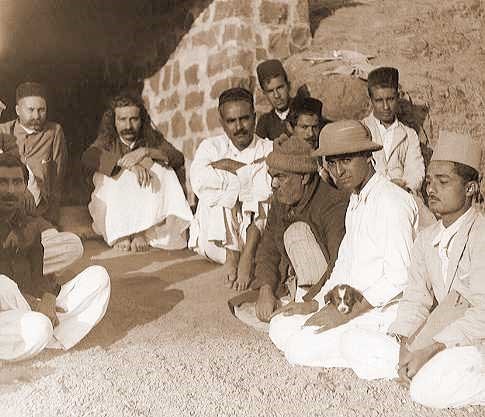
Meher Baba with his disciples outside the Panchvati Cave in Meherabad

Meher Baba with his disciples outside the Panchvati Cave in Meherabad
On May 7, 1924, Baba sat in seclusion in an insect-proof room. Baba had declared that after entering the room he would cease to speak and convey his thoughts in writing only. But later in the evening Baba talked and said that he had suffered physically, not because of the fast, but because of intense spiritual work. This was probably the first indication of Baba’s forthcoming silence. On July 8, 1925, Baba called a meeting of his disciples. For about an hour, he explained what the duties of each would be. The time of his silence was approaching.
The next day he summoned the parents and guardians of the boys in the school and explained what they should do to keep the school running. He would not speak, he said, because his spiritual task would be heavy. The time was close for the dropping of Babajan’s body; also there was turmoil, the wars and disasters which were coming to the world and to India in particular. He asked them not to lose heart. This period of crisis would end and there would follow a period of peace and tranquility. At the beginning of his silence, Meher Baba wrote continually for hours daily the as yet unpublished book which Baba declared as his Message to the world. Baba stated that in this work he has revealed hitherto unknown spiritual secrets. Adi K. Irani, Meher Baba's secretary, read two pages of the book of which he remembered nothing. In this book, Baba used words and phrases from several different languages. Rano Gayley, one of Baba’s American disciples, even made illustrations and charts for the book, all under Baba’s direct supervision.
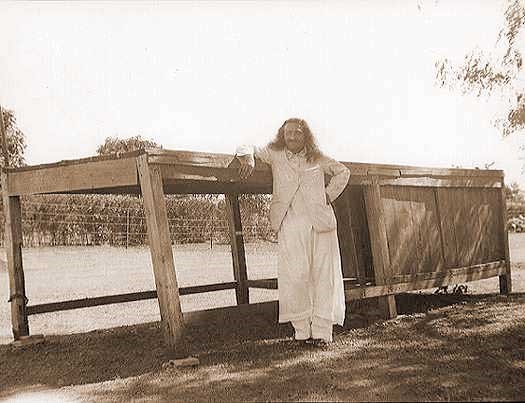
Meher Baba alongside the table-room he used to write the hitherto unpublished book

Meher Baba alongside the table-room he used to write the hitherto unpublished book
Describing the beginning of this most wonderful event in the history of mankind, Faredoon Driver (Padri) narrates what happened on the night of July 9, 1925:
Before retiring at night at about 8:30 p.m. Baba talked and gave instructions to his mandali. At about 8:30 p.m. his words were, 'I am now going. From tomorrow I will not speak for a year. All of you must take care of your health; and remember, when any of you go out of the ‘makan’ during the night to attend to your needs, always carry a lantern with you. Beware of snakes. I will do anything to help you in other difficulties, but I will not help you if you are bitten by a snake.’ This was his final order. Baba left the 'makan' for his ‘jhopdi’ at Meherabad. The mandali too retired for the night. A few minutes later I took a lantern, stepped out about five to seven paces to relieve myself.
Suddenly, by the light of the lantern I saw a snake in my path about twenty feet ahead and started shouting, ‘Snake, snake.’ The mandali rushed out with sticks and killed the snake. Baba, hearing the commotion, returned and on being told of what had happened, once again enjoined about carrying a lantern and to beware of snakes. Finally he said (spoke): ‘Now I am going,’ and went away. When we saw him on the morning of the tenth, he uttered no words.
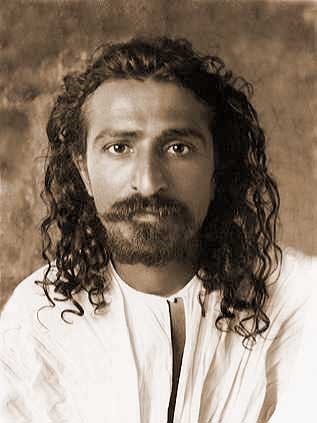
Meher Baba just before he started his silence on July 10, 1925

Meher Baba just before he started his silence on July 10, 1925
Baba’s silence had begun. Silence. Not to speak. Not to use sound. But not isolation. His routine would go on. Baba said about this period later:
At that time I communicated by writing on a slate and also, for more than a year, wrote for a number of hours daily on a work which remains unseen and unpublished to this day. I did most of my writing work in my small cupboard-like room constructed underneath the big wooden table which stands near the ‘dhuni’ (sacred fireplace). It was at this time (November 1925) that we began to light the dhuni each month.
At certain fixed hours I saw visitors freely. Hundreds came daily for my darshan believing in my spiritual status, but most sought my blessings only for material benefit. On special occasions the stream of visitors would continue unbroken from morn to night and their numbers would run into thousands.

Meher Baba's birthday celebrated in Meherabad in 1925

Meher Baba's birthday celebrated in Meherabad in 1925
During the Meherabad phase, many exciting events took place. Once a sadhu who wanted God-consciousness came to stay with Baba and agreed to remain under his instructions for a year. But not even a day had passed before the sadhu began to grumble about one thing or the other. Baba conveyed to the sadhu that God was not a ‘cheap fruit’ to be had for the asking, but demanded superhuman patience! The sadhu went away.
On yet another occasion a yogi came to Baba for divine guidance. Baba asked him to stay at Meherabad and added the following peculiar words to his instructions. ‘Matla, chatla, ghotla, vatla, satla, chotla, and potla’ — the necessities for the life of a sadhu — a begging bowl, a water pot, a wooden rod, long braided hair and the bundle. For ten days the yogi went on with the instructions and on the tenth day asked Baba for leave. He complained that the food was not quite palatable!
The Meaning Of Death
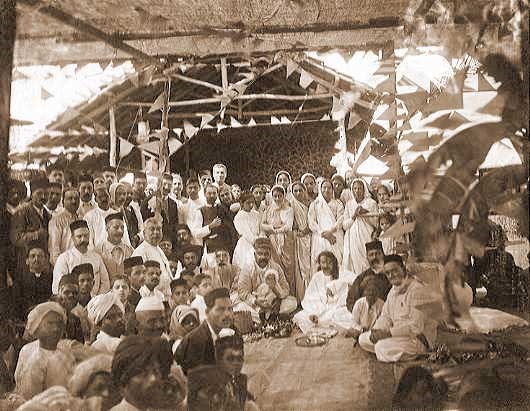
Meher Baba gives darshan in Ahmednagar

Meher Baba gives darshan in Ahmednagar
Many a time visitors would come. There were men of intellect; they came to test Baba’s knowledge or to find proof of his spiritual status. On one occasion, a yogi, who had a large following and lived about 50 miles away from Ahmednagar, came to see Baba with the purpose of testing him. Baba usually did not see people of this sort, or answer their questions, but on this occasion he was in the mood and he asked the yogi to be brought to him. The yogi was given a slate to write his questions, and while he wrote, Baba also wrote on another slate, finishing his writing before the yogi had finished his. When the yogi’s slate was handed to Baba, he put it aside without looking at it and handed his own slate to the yogi; it contained the answers to his questions. The yogi got up, prostrated himself and apologized profusely.
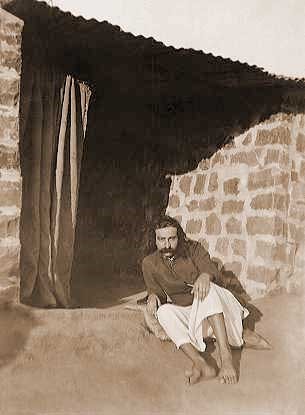
Meher Baba outside the Panchvati Cave in Meherabad

Meher Baba outside the Panchvati Cave in Meherabad
Sorabji Desai, distinguished Gujarati writer, during a visit to Meherabad on March 22, 1927, collected the dust of Baba's feet and said to himself that the onlookers would mistake him for a mad man. But to his utter surprise, Baba quite unexpectedly gave an example of Swami Vivekananda collecting dust from his Guru's (Ramakrishna's) feet and applying it to his forehead. Baba further explained not only the dust of the feet of the masters but everything connected with the master's physical movements had one significance or another and held tremendous importance. In a letter written to Mr. Desai, signed Merwan, Baba wrote:
Dear Sorabji,
May that Truth which is unbounded be your guide, and lead you to its infinite sovereignty and hold you to its own. When we are true, we enjoy true heavenly happiness even if the whole world be up against us; but, if falsehood be reigning in our heart we find the very hell ringing hot within us with all its horrors therein, in spite of our finding the whole world at our feet.
Therefore may Truth and only Truth be your guide, friend and companion, is my blessing for you and yours.
Merwan
On February 27, 1926, Baba was given a telegram from his father. It was the news of the sudden death of Jamshed, Baba’s eldest brother. Mani who was present at her brother's bedside, narrates:
I can little remember my eldest brother Jamshed during the years of his life, but I well remember the time of his death, for I was there with him in Loni when he died at about the age of thirty-three and I was seven at that time. One thing I knew about him without a doubt and that was his intense love for Baba. At the time of his death he was with his foster parents and his wife in the village of Loni where my aunt and uncle lived for some time and where I was holidaying then. He too had been sent there by Baba for a few days. He seemed quite all right, and suddenly one night he had a pain in the heart. It was at midnight, and my aunt made him a cup of coffee and his wife rubbed some unguent on his chest. He had an intuition of his approaching death, for he bowed down at the feet of my uncle and aunt and asked their forgiveness for any omissions and commissions. He told them never to forget that Baba is God and told his wife never to leave Baba under any circumstances. Then he went back to bed. Just before dawn he died and with his last breath called out in a loud, clear voice, three times: ‘Baba, Baba, Baba.’
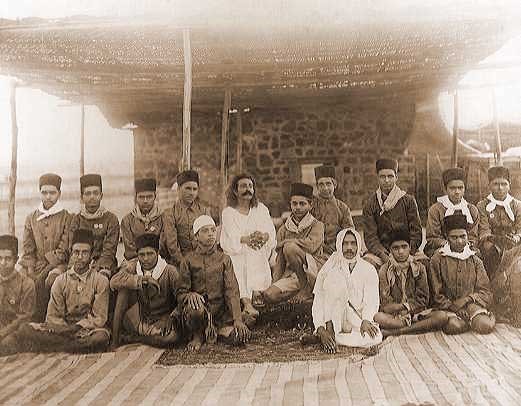
Meher Baba with the Prem Ashram boys in Meherabad in 1927

Meher Baba with the Prem Ashram boys in Meherabad in 1927
When Baba asked the mandali if they felt any grief, they replied, “yes.” Baba smiled. He said their grief was not genuine; it was hypocrisy and selfishness.Someone said:
But from a worldly point of view, everyone must feel it. "But why?" asked Baba. "That is where the mistake is made. It is all false." "Was he not your brother, is he not dead?" remonstrated another. Baba replied, "He was indeed my brother, but he is not dead. On the contrary, he is resting within myself." "But how are we to know and appreciate that?" asked one mandali member. "From believing those who know the secrets of life and death," was Baba's final answer.
While yet on the subject of death, Baba said:
Death is common to all. It is a necessary step forward towards life. The soul changes into a new abode, and thus death means no more than changing your coat. Or it may be compared with sleep. The difference between death and sleep is that after the first, one wakes up again in a new body, while in the latter one becomes conscious of the same body. Worldly people do not go into hysterics after one who goes to sleep at night because they expect to see him awake again. Then why not exercise the same indifference when he sleeps the sleep of death, since he is bound to wake up again sooner or later in a new body? Thus the selfishness of not being able to satisfy their minds in the absence of the sight of their dear ones makes them weep, not so much the death itself.
After the death of a person, a cry is raised from all sides. ‘My beloved father is dead.’ ‘The source of my life is gone.’ ‘The light of my eye is dimmed.’ ‘Where is my sweetheart?’ ‘My supporter has disappeared.’ But in spite of the display of grief and pain, the ‘my’ and ‘mine’ remain uppermost rather than consideration of the welfare of the one who has passed away.
The sword of death has been swinging right and left since the beginning of man's history. Every day I see hundreds and thousands of my brothers dying without feeling anything, and Jamshed's death is no exception to that. All admit that death is the unavoidable end and though the fact is universally acknowledged and experienced, yet at the time of its happening people start crying. That is either madness or weakness of mind! But Jamshed is not dead. If he were really dead, all should rejoice over it, since it means Real Life. Although you find me moving amongst you, playing with you and in fact doing all that a supposed living man does, I am really dead!
I am living because I am dead! Die all of you in the real sense so that you may live ever after!
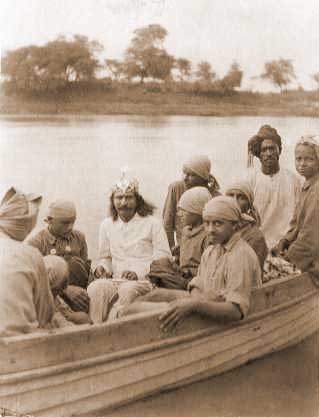
Meher Baba with some of the Prem Ashram boys in Toka in 1927

Meher Baba with some of the Prem Ashram boys in Toka in 1927
Real Education
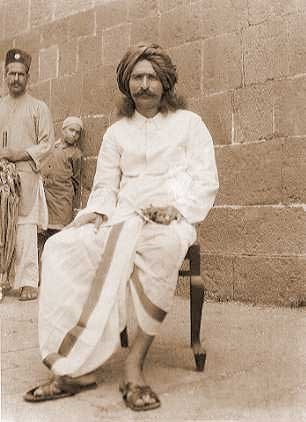
Meher Baba photographed in a Maharashtrian dress in Toka in 1928

Meher Baba photographed in a Maharashtrian dress in Toka in 1928
Meher Baba had not spoken for one and a half years. On January 1, 1927, he stopped writing as well and started using an alphabet board to convey what he had to say. On the first day of May the same year, Baba opened the Meherashram, on the outskirts of Arangaon. This was a school for boys to provide secular and spiritual education. This school was later shifted to Meherabad. It had started with ten boys: 4 Brahmins, 3 Mahars (untouchables) and 3 Marathas. In the later years, reminiscing on the school and its activities, Baba had commented:
This school known as ‘Meherashram’ was started as a small day school for the boys of the adjoining village of Arangaon. After some time it was turned into a regular boarding school that housed more than a hundred boys. Efforts were made to collect them from various cities and different countries. One of the mandali was sent to England for that purpose. None came from the West, but a number of boys from Iran did join the Meherashram. My first aim was to arrange for teaching the boys English through their various vernaculars, by standards set up in the University of Bombay. Having accomplished this, I began to spend all of my time, day and night, on the general welfare and spiritual upliftment of the boys.
When Hazrat Babajan visited the school to see “the place of my child” it was a great event. But Baba indicated that this visit made it necessary for him to move the ashram from Meherabad to the village of Toka. The transference was completed within fifteen days. During the Toka stay Baba was very close to the boys and he did whatever they desired, at times undergoing immense suffering. During this period the boys were engaged in meditation as well, getting up early in the morning for that purpose.
This was also the period when I carried out one of my longest continuous fasts, which lasted five and one half months (November, 1927-April, 1928). Once during this period I took nothing but a few sips of water for more than twenty-eight days. The remainder of the time I lived on cocoa in milk taken once in twenty-four hours.
Spiritual Transformation
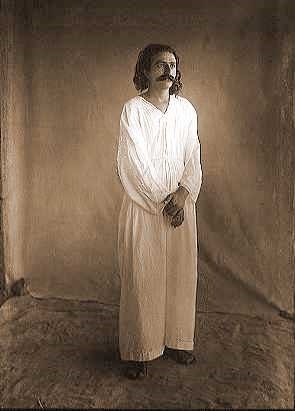
Meher Baba wearing a sadra (long flowing garment) in 1929

Meher Baba wearing a sadra (long flowing garment) in 1929
Those who had come to live with Baba had changed totally, as if their lives had been transformed. They had strange experiences, both internal and external. Of special significance is an incident which occurred during the Ashram days, herein adapted from Ramjoo Abdulla’s account in his book, Sobs and Throbs:
On January 1, 1928, the fifty-second day of Baba’s fasting and the twelfth of his self-imposed confinement, a majority of the boys began to break into tears at different times throughout the day.
For about an hour between seven and eight in the evening, this awesome phenomenon held the onlookers spellbound. The tumult could be heard a quarter of a mile away from the ashram.
Among all the boys, the weeping of one in particular, Aga Ali, was most pathetic. On January 28, Baba openly declared Ali to be quite ready with sufficient love to enable him to be taken away from the domain of the “bound” to the region of the “free” but for a final touch from Baba!
On the following day Ali went into uncontrollable sobbing. The sobs were heart-rending and Ali’s whole frame shook. It was nearly 9:30 at night and this piquant drama had continued for nearly three hours. Ali seemed beyond the capability of controlling his sobs. But only a few minutes later Baba gathered Ali in his arms, patted his head, imprinted a kiss on his forehead and placed his head on the boy’s heaving bosom for a few minutes. Ali became as calm as a millpond. The onlookers soon realized that Ali would not open his eyes, and when his eyelids were pulled up, the iris was found turned inward.
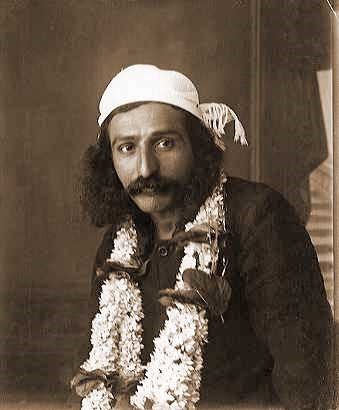
Meher Baba in Madras in 1927

Meher Baba in Madras in 1927
Several questions were repeatedly put to him but he did not reply. After some time, to a question, "How are you, Aga Ali," he replied "Khush" (happy). "What do you see?" "Baba." "Where?" "Everywhere."
In May, 1928, Baba with his mandali was traveling in a car from Bombay to Meherabad. The car, a sturdy Hudson Super Six, managed to climb the Bhor Ghat, between Khopoli and Khandala, but about half way the car began to roll back. All attempts of the driver to stop the car failed, for even the brakes were out of order. The vehicle was heading for a deep chasm. Baba leaned on one side of the car, pressed it down with his hand and it came to an instant halt! Many miraculous incidents have been attributed to Baba and he persistently denied them. He always attributed such incidents to the faith and love of his disciples.
The same year the school was divided into two sections, the general section where normal studies went on, and the 'Prem Ashram,' a special section of the school where boys spent their time in meditation. Baba continued to give most of his time and attention to the Prem Ashram boys. To teach humility, Baba cleaned the boys' toilets with his own hands for a period of one month.
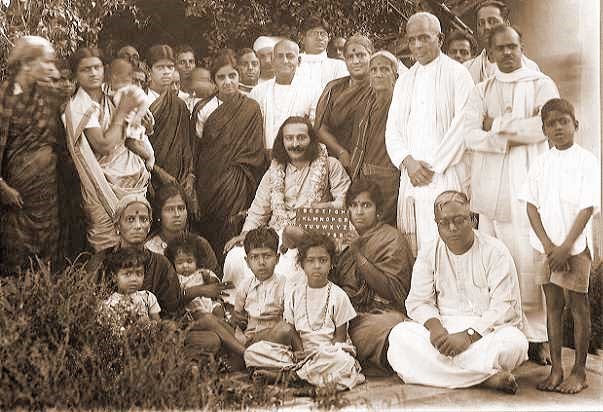
Meher Baba with devotees during his visit to Madras in 1927

Meher Baba with devotees during his visit to Madras in 1927
In September of 1929 Baba paid a second visit to Persia (Iran). He visited several places, and in Yezd, where he stayed for four days, the entire town flocked to greet him. He met people individually and in groups. Iran was passing through a transitional phase in history. Those who had come to meet Baba thought his visit was a good omen: maybe this would bring the country's redemption.
The year 1930 was spent by Baba mainly in touring large areas of India. He would travel by every conceivable mode, irrespective of discomfort.
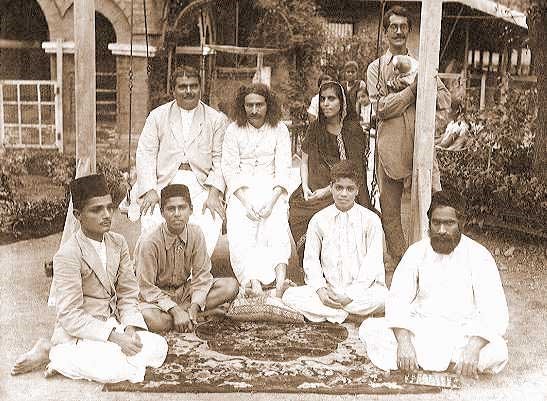
Meher Baba with the Jessawala family in Jabalpur
